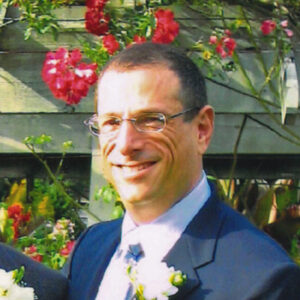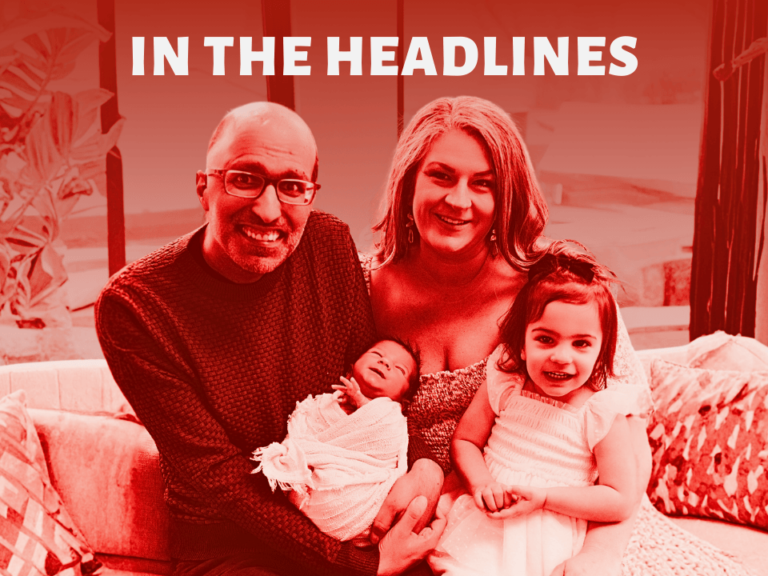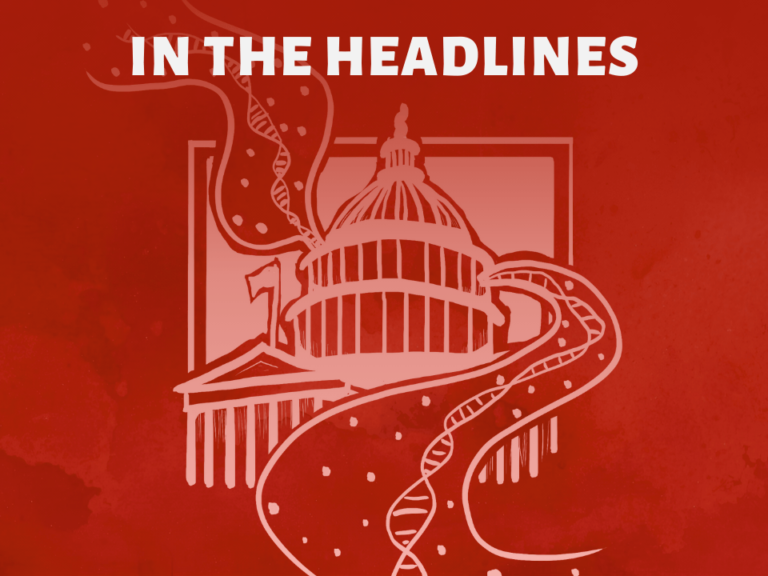Mark Haynes Smith died Nov. 3, 2022. He was my partner and husband for just shy of 39 years. He was only 63.


For those to whom the name doesn’t ring a bell, Mark spent the majority of his 35-year career working to fund and further the goals of biomedical and cancer research and policy; both on Capitol Hill as senior policy advisor to Sen. Connie Mack (R-FL), and as a principal at Liberty Partners Group, the lobbying firm he worked at before retiring in 2018.
Throughout his life, Mark brought a generosity of spirit to those who knew him, and with his passing the world lost an advocate who brought access to treatments and research opportunities that made life better. Mark was an expert on cancer policy, biomedical research, health care funding, patient advocacy, and other related causes. He passed in my arms after a more than two-year fight against lung disease.
When we moved to Washington in 1988, Mark wasn’t particularly looking for a healthcare-adjacent job. He knew he wanted to work in politics and looked for a job all over Capitol Hill. He was intent on working on policy issues. He tried House members and Senate offices but hit the same roadblocks—no law degree and no intern or page gigs.
Mark’s work, beginning with his time with Sen. Mack, galvanized the cancer community around the vital need to increase federal investment in research. The bipartisanship we still see today around funding for NCI and NIH is a direct outcome and legacy of Mark’s [commitment].
Ryan Hohman
He found himself sitting in the waiting room at the office of the newly elected Sen. Mack. They had nothing for him, but something caught the eye of Sen. Mack’s chief of staff at the time, who took his number. That weekend, Mark got a call that they had a job for him. “It’s nothing fun or glamorous, but it’s a start!” Mark grabbed the job, as essentially Sen. Mack’s driver.
After getting lost on more than one occasion, Mark was “promoted” to legislative correspondent, writing letters to constituents, with Sen. Mack telling his chief of staff, “We need to find something else for Mark to do.” He was promoted again when a legislative aide vacancy came open. As luck would have it, the aide position was to focus on health care policy, research, and funding. Mark was promoted over the years until being named senior policy advisor to Sen. Mack.
Mark had a knack for soaking up medical and policy information. If he didn’t know something in his area, he’d learn it. And as a congressional staffer, he had access to the best and brightest in all facets of health care policy. He met with Nobel Prize winners in medicine and doctors and specialists in all aspects of health care—from the mundane, like insurance, Medicare, and Medicaid—to the intricacies of treatments and care.
Sen. Mack had a personal connection with cancer in particular and set Mark out to focus attention on ways to improve cancer care, treatment, and prevention. He was like a savant. And he worked with Republicans and Democrats, forging strong relationships across the aisle and maintained those relationships for years.
Among others, he worked with Sens. Ted Kennedy (D-MA), Dianne Feinstein (D-CA), Jay Rockefeller (D-WV) and Sam Brownback (R-KS) and Reps. Ben Cardin (D-MD) and Nancy Johnson (R-CT) and their staffs, on a bipartisan approach to cancer issues. When Sens. Mack and Feinstein established the Senate Cancer Coalition to focus attention on cancer policy issues, Sen. Mack chose Mark as the group’s principal staffer.
Mark’s skill at working across party lines helped lead to the astonishing doubling of NIH funding, from $13 billion to $25 billion over 5 years. Mark knew this improved healthcare quality and access for millions and cleared the way for much needed modernization of the Institutes. Notably, Mark collaborated with former National Institutes of Health (NIH) Director and geneticist, Dr. Francis Collins, to fund to completion the then-brand new idea for a Human Genome Project.
He also worked to improve the U.S. Food and Drug Administration, the Health Care Financing Administration (now the Centers for Medicare and Medicaid Services) and other federal agencies. He took pride in advocating for much needed electronic medical records technology, improving transparency and information-sharing among patients and their healthcare providers.


Following Sen. Mack’s wife Priscilla’s breast cancer diagnosis, and during a time when discussion of breast cancer was considered prudery, Mark earned the nickname “Breast Boy” for his commitment to improving coverage and conditions for breast cancer research and patients. With Sen. Feinstein’s office, he succeeded in getting approval for the first breast cancer postage stamp, which has since raised upwards of $100 million toward research, clinical trials, and prevention.
Mark worked on other cancer initiatives, too. “I think people are really aware of Mark’s role in advancing breast cancer research and his work in doubling the NIH budget,” Carolyn “Bo” Aldige, founder of the Prevent Cancer Foundation told me. “What isn’t as widely known is the important role Mark and Sen. Mack played in getting colorectal cancer on the nation’s radar. In the late-nineties, there was very little attention focused on colorectal cancer. It was the third leading cause of cancer deaths despite there being valid and effective screening, prevention and treatment methods.
“Mark and Sen. Mack led the charge with our foundation and other advocacy groups to recognize March as National Colorectal Cancer Awareness Month. It was one of the last official acts of Sen. Mack’s term and he personally walked the proclamation to the Senate Cloakroom for signatures and support. But it was Mark who brought to the senator’s attention how important a proclamation would be in focusing attention on the disease.”
He never wanted the credit or the spotlight—he always put the senator or his client in the front row. He just wanted to know that the work he was doing mattered and that we were making progress.
Ilisa Halpern Paul
Another of his successes dealt with patient access to clinical trials. Prior to 2000, Medicare and insurance companies would not pay for patient’s otherwise routine care costs if the patient was participating in a clinical trial. This fact was a significant barrier to patient ability to participate in research studies, particularly older Americans.
Mark and others worked with Senate and House staff, the Health Care Finance Administration, and the Clinton administration to push for expanding Medicare coverage, knowing insurers would follow. These efforts resulted in President Bill Clinton issuing an executive memorandum requiring Medicare to cover routine patient care costs associated with clinical trials. This eventually was codified into the Affordable Care Act, specifically including private health insurers.
In 2000, after Sen. Mack decided not to seek reelection, Mark transitioned to the private sector where he continued his healthcare advocacy. Mark’s expertise helped guide physician organizations, pharmaceutical and biotechnology companies, trade associations and nonprofit organizations working on behalf of patient care and access, patient advocacy coalitions, medical research centers, community health centers, hospitals and hospital systems, and others.
Among his favorite work was staffing the National Coalition for Cancer Research (NCCR), an organization bringing together the nation’s Comprehensive Cancer Centers and other research, professional and patient organizations to educate the general public about the value of cancer research and to advocate for basic, translational and clinical research.
NCCR hosted quarterly “Cancer 101” training sessions for members of Congress and staff on topics ranging from The Beau Biden Cancer Moonshot Initiative: Current and Future Cancer Research Objectives, to The NIH Innovation Fund, and the 21st Century Cures Initiative, which established strategic focus areas for funding, including biomarkers, precision medicine, and infectious diseases.
Mark saw the benefits of a focused approach to advocacy and worked to coordinate the approaches of various advocacy groups—bringing physicians’ groups and patients’ groups, for example, together.
Ryan Hohman, vice president of Friends of Cancer Research remarked how “Mark’s work, beginning with his time with Sen. Mack, galvanized the cancer community around the vital need to increase federal investment in research. Through his subsequent leadership of NCCR, he brought all stakeholders together and was one of the key people in Washington to not only increase, but double the NIH budget. The bipartisanship we still see today around funding for NCI and NIH is a direct outcome and legacy of Mark’s [commitment].”
Jon Retzlaff, chief policy officer and vice president for science policy and government affairs for the American Association for Cancer Research, told me, “Mark was a wonderful and special colleague for nearly a decade during his stewardship of the [NCCR]. Through his superb work, his commitment and dedication to the cause, and his politeness and inclusiveness, Mark made a major difference for patients with cancer. We miss him very much in our ongoing and collective efforts to provide hope and encouragement for everyone who has been touched by cancer.”


Over his career, Mark spoke at national medical, scientific, and health policy conferences, and periodically, he addressed Georgetown Medical School students on healthcare policy and ways for doctors to become informed and involved in policies affecting their future practices.
Later in his career, Mark co-authored a chapter titled “A Brief History of Major Federal Cancer Policy—1970s to Present” in “Cancer and Health Policy,” a book published by the Oncology Nursing Society in 2015.
His co-author, Ilisa Halpern Paul, now senior policy advisor at the Venable Law Firm, told me she first met Mark as a lobbyist when she was at the American Cancer Society in the late nineties while Mark was working for Sen. Mack. “He was sharp, tough, and hard-working and really knew his stuff. He asked great questions and was never an ‘easy get’ when we were trying to convince him of the merits of what we were requesting.
“He made me a better lobbyist because of the questions and push-back he gave me. I went in to meetings with him ‘extra prepared’ and because of him I learned how to better anticipate opposition and tough questions that staff might ask.”
The legacy of Mark’s life will carry on in the lives of the many he touched, many who will never know the role he played in getting them the cancer and other medical care and treatments that saved or prolonged their lives and let them spend more time with their families and loved ones
Scott Schwartz
As with many of Mark’s colleagues, IIisa found a friendship with Mark and used that to develop insights on becoming better advocates. “Mark saw his job—his calling—to advance policies and programs that were going to make the world a better place, particularly for people with cancer or at elevated risk for cancer,” she said.
“He never wanted the credit or the spotlight—he always put the senator or his client in the front row. He just wanted to know that the work he was doing mattered and that we were making progress. While he was with Sen. Mack, we worked on advancing access to cancer clinical trials for Medicare beneficiaries and increasing funding for NIH and NCI; he felt strongly about supporting the nation’s research enterprise so more cures could be uncovered.
“As consultants, we worked together to address the nation’s nursing shortage and to support oncology nurses, specifically. And, he saw the importance and value of a multi-disciplinary team of caregivers for people with cancer—physicians, nurses, social workers, pharmacists, etc. and sought to ensure that people with cancer had access to the care they needed and deserved.
“Mark was a caregiver himself. He was loving, devoted, and reliable—as a son and also as a colleague and friend.” And regarding working with Mark on the History of Major Federal Cancer Policy for the Oncology Nursing Society, she said, “that exercise was harder than we both anticipated but he brought his usual tenacity, work ethic, humor, and intellect to the task. He was an encyclopedia of knowledge about cancer policy and that was essential to our ability to complete the chapter.
“Mark made the world a better place—because of his public service as a congressional staffer, because of his contributions as a cancer community lobbyist, and because of his kindness and support of colleagues like me who were fortunate to call him a friend. He will be missed and his passing leaves a hole in my heart and many others.”
I actually had to research most of the above because Mark wasn’t one to boast to me about his work. It was just “what he did today at the office”-type conversations when he got home and what he really wanted was to enjoy a gin and tonic, cook a fantastic meal, and relax with me and our dogs.


He really sought refuge from the stresses of Hill life and enjoyed coming home to classical music—he loved pianist Daniil Trifonov—but would also watch Queen and other rock concerts from start to finish on YouTube. We spent weekends in the mountains of West Virginia and enjoyed the quiet life there. I miss him every day, but it’s comforting to know how much he helped others.
Mark was born in Panama City, FL, and moved to Winter Park, FL, after his parents divorced. When Mark was about 2 or 3, his mother married James Strait, who became stepfather to Mark and his older brothers.
Growing up, Mark was active with the Children of the American Revolution (CAR), an organizational offshoot of the Daughters of the American Revolution. Mark could trace his family history literally to the Mayflower. He rose to president of the Florida Chapter and national vice president of CAR.
He attended Winter Park High School and earned degrees from Western Kentucky University, Bowling Green, (the alma mater of his mother and grandmother). Mark was an active member of Tau Epsilon Phi, where he also served as president.
After graduating, Mark got a job in Orlando working for Holiday Inn. He came to Miami one weekend in November 1983 to see some friends, one of whom, a friend from CAR, was a student at UM Law School and a friend and study partner of mine. While visiting him, Mark and I met and have been together since. Mark would visit every other weekend until spring 1984 when he transferred to Miami so we could be together. On his visits he loved making snacks and listening in as I studied with my study groups. He picked up information so fast it was clear he needed to be doing something else.
He hit it off with my family and even though raised Christian, Mark knew more Yiddish from my mother than I did! And if he didn’t know a word, he’d make one up without missing a beat, with an appropriate and usually humorous guttural sound. My parents adored him and his joy, intelligence, and caring, and he helped them acknowledge and accept our relationship. In that sense, he brought my own family closer.
Mark “retired” in 2018, and became a hospice volunteer and bereavement counselor with Capital Caring. He visited patients and families and, when COVID hit, he’d check in with his “families” by phone. And over the years, both during his career and after, friends, friends of friends, colleagues, or others who were referred to him, would call to ask about their own cancer medical journey.
Mark always took the time to explain where and how to find the best resources, obtain access to available coverage, gave references to clinical trial information, and told them which cancer centers had particular focus on particular cancers, and he would even make calls to help. As Sen. Mack put it, “Mark was a person of deep empathy. His love and concern for patients and his clients is what made him special. He will be missed by all.”
Andrew Woods, Mark’s friend and colleague for 35 years, and his partner at Liberty Partners Group, described Mark’s empathy from a personal perspective, one I wasn’t aware of until Andrew relayed his experience. “My son has some unique learning challenges that often led to episodes of very cruel bullying,” he told me. “When Mark learned of the pain my son was experiencing, he immediately reached out to share some of his own painful experiences and the life lessons he learned from those trying times.
“Mark developed a close, supportive relationship with my son for which he and I will always be grateful. Mark was a true friend, mentor and role model and he will be truly missed. The lessons Mark taught my son will keep Mark’s spirit alive for many years to come.” He summarized, “Mark made a tremendous difference in the lives of so many people.
“He did not just mark his time on Earth. He left the world a much better place by having lived such a caring and compassionate life. The ripple effect of the love and concern he showed others positively affected people he never met. Those of us who knew and loved him will always remember a man who lived a successful life to the fullest by putting others first and comforting those in need.”
As hard as he worked, Mark loved to get away from it all. We roamed the world. We were able to visit Southeast Asia; New Zealand; Fiji; and throughout Europe, the U.S. and Canada. His favorite of our trips was when we spent our 30th anniversary in South Africa, Botswana, and Zimbabwe. And Mark loved food and fine dining. We had the pleasure of enjoying some of the top restaurants in the world together and with friends.
Mark loved animals but especially dogs and dog shows, and horse racing. As a kid, he and his mother loved showing their dogs and that interest continued for the rest of his life, attending and watching dog shows, from local events to the Westminster and National Dog Shows, even traveling several times to NY to see Westminster in person.
And one of his favorite photos was of us standing with Zenyatta, one of the best female thoroughbreds in the world. We were fortunate to be invited—twice—to Kentucky to spend time with this amazing horse. Mark painstakingly handicapped race horses and while he never spent much to bet, he’d keep track of his “winnings” as if he had.
In 2020, Mark was diagnosed with pulmonary fibrosis and pulmonary arterial hypertension. After pharmaceutical efforts couldn’t help him, he asked to be admitted into the Inova Fairfax Hospital Transplant Program. It was a long hard slog to get all the tests and procedures completed to get on the transplant list and Mark treated it like a job. He’d be on the phone at 9 a.m. trying to get appointments for tests to clear the way for a transplant.
Finally, in December 2021, Mark was recommended for transplant and he received a double lung transplant in January 2022. He was ever-grateful to the donor family and the excellent care he got at Inova, frequently commenting on how their coordinated approach was one of the things he fought to see happen in patient care.
He was doing great for the first few months, even working up to walking 1.5 to 2 miles a day without oxygen supplementation. In June, he was well enough to go to a baseball game for his birthday. In July, however, he started developing a series of infections and even as he’d get over one and plan to come home, he’d develop a new one that kept him hospitalized. He finally succumbed.
Mark is survived by me, his partner and spouse of 39 years, his brother Harry A. “Hal” Smith; niece Halle Axelsson (nee Smith); nephew Preston Smith; half-sister Jody Dalto (nee Smith); and many friends and colleagues.
The legacy of Mark’s life will carry on in the lives of the many he touched, many who will never know the role he played in getting them the cancer and other medical care and treatments that saved or prolonged their lives and let them spend more time with their families and loved ones.
For those who knew Mark, especially me, his absence will be felt intently. And to all who knew and worked with him and had the luck of having Mark in their lives, the hole in our hearts will be tempered by remembering his kindness, his smile, his humor, and his love.












